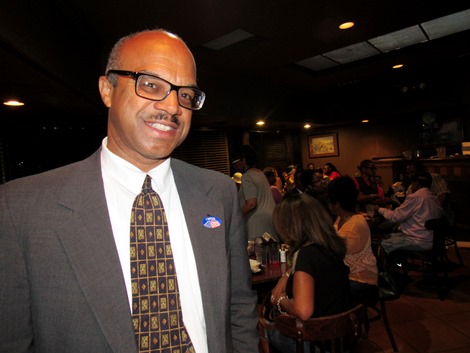
Window on the West
Opinion column
by Mary Rupert
While state Sen. David Haley did not make it through the primary election for mayor of Kansas City, Kansas, on Aug. 1, he may still wield a lot of influence, if he chooses to endorse another candidate.
Candidate endorsements may play a role in the general election. Incumbent Mayor Mark Holland received the endorsement of the MainStream Coalition before the primary, and he also was supported by some prominent leaders of the local Democratic Party. Challenger David Alvey received the pre-primary endorsement of the police and firefighter political action committees. Alvey also may have some Board of Public Utilities individuals’ support, and some support from former county government employees.
Endorsements may not be all that is needed, however. During the mayoral election four years ago, Nathan Barnes’ gave his endorsement to Ann Murguia, but it was not enough to win the election.
Despite being underfunded and entering the primary campaign late, Sen. Haley still received 18.5 percent of the vote, compared to 40 percent for Holland and 31.6 percent for Alvey. Janice Witt received 7.4 percent of the vote, and D. Keith Jordan, 2.37 percent.
On the day before the primary election, Sen. Haley said he heard during his campaigning from a lot of people concerned about high property taxes. That was one of Haley’s campaign themes, along with a pledge to expand economic development to the eastern part of the county. At different times, other mayoral candidates expressed the same positions.
Campaign spending
According to Haley, Holland raised about 15 to 1 in campaign dollars in the primary compared to him, and Holland reported around twice as much as Alvey.
Haley said he raised about $4,000, and spent about $3,500. Haley quipped that he would probably receive more votes per his campaign expenditures than the other candidates.
The mayor’s contest was a bit hard to predict for some observers because three candidates, Holland, Alvey and Haley, had good name recognition from running for office in the past, and some of them had well-known family members who were on the ballot in past years, as well.
Holland remarked at his election night watch party that it was the fourth time he had run county-wide. Having a campaign team of volunteers in place county-wide made a difference, and apparently, the funds available to send out mailers to voters.
Alvey said at his election night watch party that he intended to expose Holland’s statements that everything was going well in Wyandotte County. He also said he favored development in other parts of the county.
At his election night watch party, Haley wanted it known that his campaign had shifted the focus to other parts of Wyandotte County, and he was in favor of developing and helping small businesses in other parts of the county.
While the candidates usually don’t oppose Village West or the developments near it, they often have said during the campaign that they want new developments in other parts of the community.
Turnout was key
Voter turnout was one of the keys to the Aug. 1 primary. There is speculation that some voters were so disillusioned with national politics that they didn’t vote in the primary. The turnout showed that candidates were able to get voters to the polls despite some misgivings on citizens’ part. While Haley sometimes drew attention to areas that needed improvement during the campaign, he also said there were a lot of good things to report on the local level.
Haley, a Democrat who plans to keep serving in the state Senate, said although the municipal elections are nonpartisan, he believed that he and Alvey were competing for the Republican votes in the county.
Briefly glancing around some of the watch parties on election night, I observed some past and present leaders of the local Democrats at Holland’s party, with some others also at Haley’s.
Haley’s opinion was that the highly contested Sheriff’s contest, where five people were running, might help turn out Republican voters, who then might either vote for Haley or Alvey. An old maxim is that low turnouts favor incumbents.
Turnout here was 17.87 percent of registered voters, according to the election office, and that is considered good compared to other large counties’ primary elections on Aug. 1. Several candidate forums were held to increase voter awareness, some mailers were sent out by candidates, and the election office sent out postcards with information about voting.
There have been some comments about a low turnout, but it was pretty good or normal compared to other primary elections in the past. If we want to see turnouts of 80 or 90 percent, perhaps we’d better invent a secure way of voting from home via television or phone, or schedule elections on Sunday afternoon, providing free transportation.
Correction
In my story of July 30 about the Sheriff’s contest, Celisha Towers was listed as a Sheriff’s office employee. That is incorrect. She was a Sheriff’s Department employee in 2016, but not in 2017. (I had checked it on a UG personnel list at https://wycokck.nextrequest.com/requests/17-373, but a change had been made in employment since the list was made.)
To reach Mary Rupert, editor, email maryr@g3f.1db.myftpupload.com.
